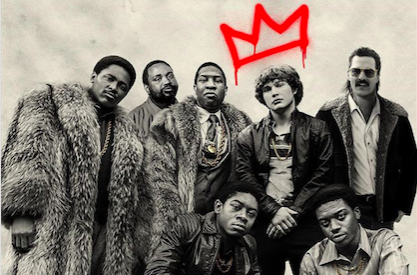“White Boy Rick” (dir. Yann Demange) tells the true story of “White Boy” Rick Wershe Jr. (Richie Merritt) and his rise to the top as a hustler, drug dealer and FBI informant, all before the age of 17 as he tries to support his family. From here, the film explores several different aspects of Rick’s life, from his relationships with his father (Matthew McConaughey) and the hustlers he befriends early in the film, to his drives with FBI agents, led by Agent Snyder (Jennifer Jason Leigh). While adapting true stories, screenwriters must choose what to cut to make the film coherent, or what elements to add to make the story more dramatic than the source material. While tremendous acting and filmmaking make the film a tolerable viewing experience, the imperfect balance of the two elements of adaptation is “White Boy Rick’s” fatal flaw.
This film has strange pacing. I couldn’t tell what would be better for the film: a 90 minute runtime or a 150 minute runtime. There are several scenes throughout the film that don’t focus on Rick, the protagonist, making them feel like they don’t belong. One example of this is a 10 minute portion of the film which takes place in a casino and finds Rick completely inactive as a protagonist. He hardly has dialogue as the scene focuses on the leader of Rick’s hustler crew and his short temper. Once the dramatic payoff of the scene concluded, I was left disappointed with Rick’s role as a bystander through these 10 minutes of screentime. Another issue lies within abrupt moments that can barely be called scenes, often appearing with no prior build up and lasting less than a minute. Early in the film, there is a scene where Rick and his crew are walking under a bridge and find a family of rats. They shoot and kill the rats, causing one of the gang members to get blood on his shirt. End scene. It is never relevant. “White Boy Rick” is plagued with sequences like this that are seemingly included because they were part of the true story, but feel like the writers were not interested enough to find drama with Rick in some of the more tense moments.
On the opposite side of the spectrum, it felt like there were important story beats that the writers either left out or that the director cut in the process of making the film. The marketing suggests that viewers will see the rise of “White Boy Rick,” but the film never shows an actual rise at all. There are never scenes or a montage showing what Rick is actually doing to gain his fortune to support his family. The film often provides the viewer with the moment where Rick makes a decision, followed by Rick donning new clothing or hiding more cash under his bed without showing anything in between. These situations are jarring to the viewer and left me curious to see what happened in between. I don’t know who is to blame for the holes in the narrative of “White Boy Rick.” Regardless, it’s disappointing that we get short scenes of characters shooting rats, and not scenes that provide answers to physically how White Boy Rick acquired his fortune and became this remarkable figure at such a young age. It comes off as lazy writing or sloppy editing.
With all of the negative out of the way, I didn’t hate “White Boy Rick.” There are moments with genuine character growth and development that made me care about the Wershe family’s current living situation, mostly because of the terrific acting from the entire cast. Richie Merritt was a fantastic discovery (this being his first major role) and provided his character with a perfect balance between a nonchalant attitude when he stands his ground and frustration when tragedy strikes. Merritt’s edge when delivering lines gave me a true sense of what the real Rick was actually like and how he got to the top. He didn’t take nonsense from anyone, and Merritt portrays that excellently. However, it’s Matthew McConaughey who steals the film. Rick Sr. is a pathetic low life who sells guns out of the trunk of his car. He is desperately trying to be a good father while also trying to provide for his family. McConaughey plays this inner conflict to a tee, creating most of the film’s emotional core with looks and tone of voice. A particular moment finds Rick Jr. in danger, causing his father to throw a tantrum and start pointing fingers (and guns) at anyone to blame. This scene gave me chills.
While the acting is certainly the biggest positive take away from “White Boy Rick,” the cinematography is also great. The grim setting of 1980s Detroit is haunting and hopeless, the city playing a major role in the financial struggles that the Wershe’s tackle. The lighting of nighttime scenes silhouette the characters, creating an eerie and gritty setting. This all feeds to the theme of the film: rising out of your history into something greater.
Overall, while this theme is a powerful one, it feels all too familiar in the crime genre. If great acting is your cup of tea, give this film a watch. If you’re looking for a film that adds new life to the crime genre with strong structure and a coherent story, you won’t find it in “White Boy Rick.”
Grade: C


Leave a Reply